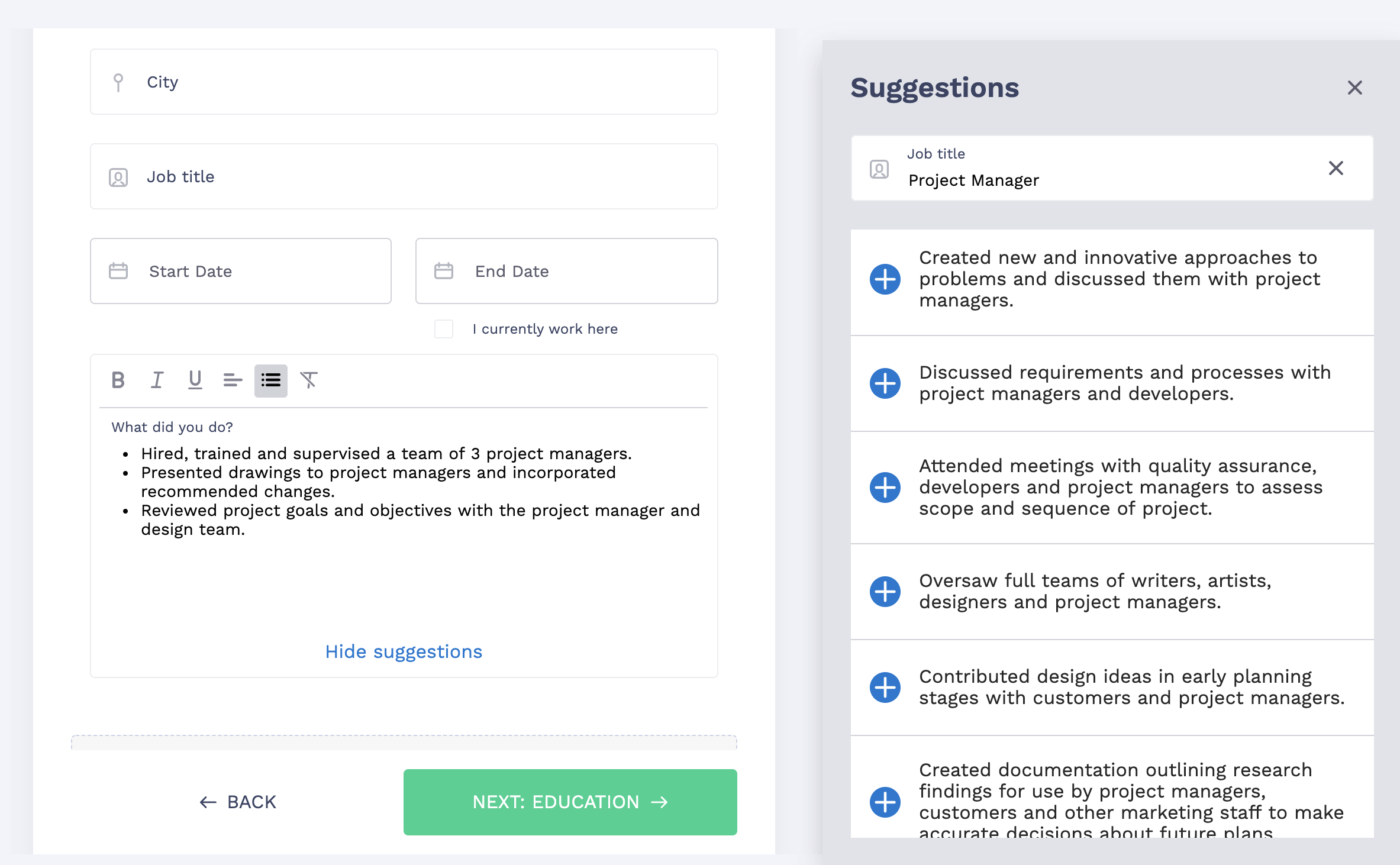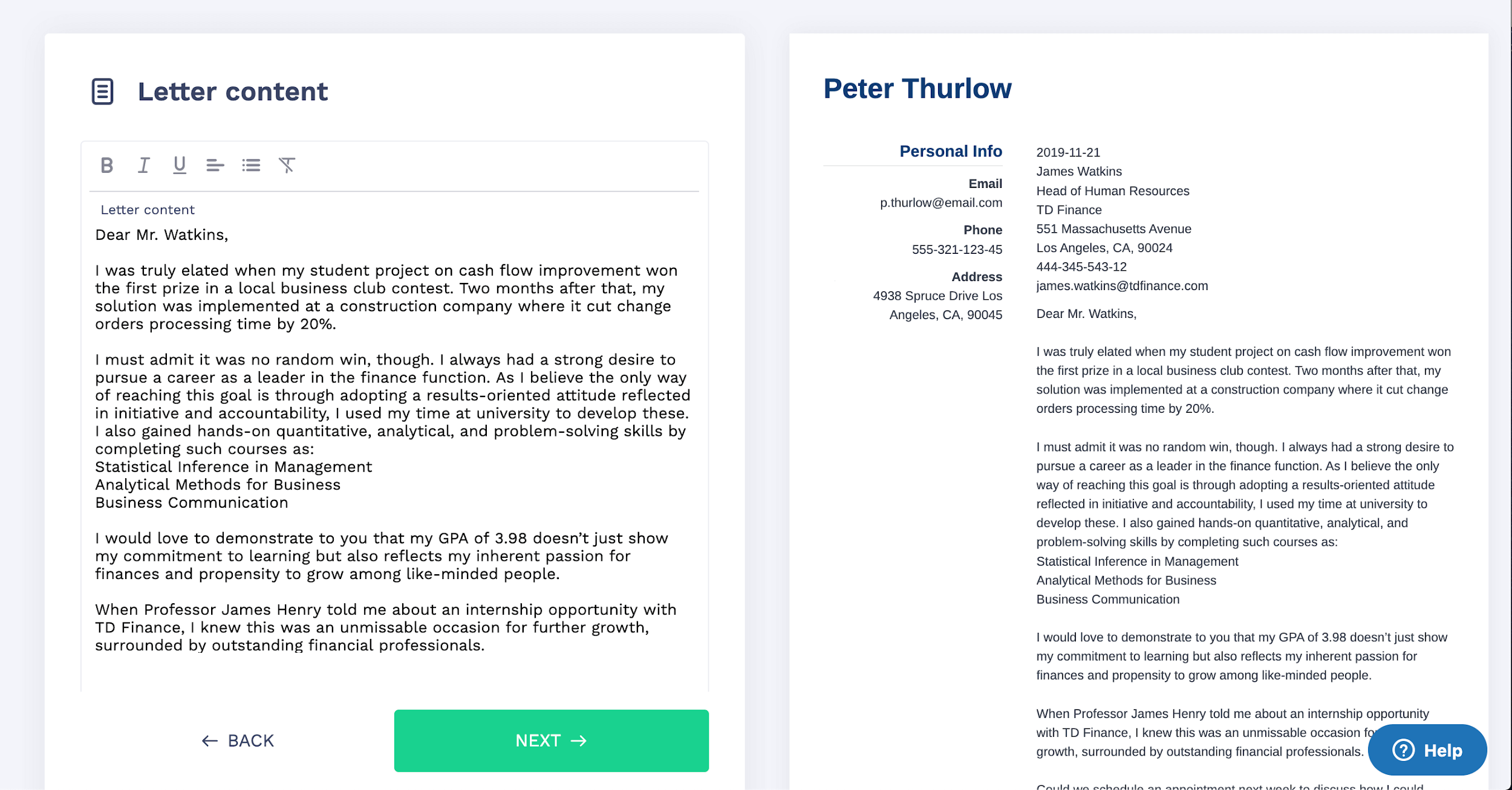
CV for Internship—Sample & 25+ Writing Tips
A CV for internships that’ll get you into the interview. Write your internship CV fast, with expert hints, 25+ writing tips & good and bad examples.

Tom Gerencer
Career Expert
Should I put references on my CV? Where? Who to list as references?
You’re here because these questions are killing you.
Don’t worry.
You’ll get all the answers (and more!) in this article.
We’ll show you:
Save hours of work and get a CV like this. Pick a template, fill it in. Quick and easy. Choose from 21 CV templates and download your CV now.

What users say about ResumeLab:
I had an interview yesterday and the first thing they said on the phone was: “Wow! I love your CV.”
Patrick
I love the variety of templates. Good job guys, keep up the good work!
Dylan
My previous CV was really weak and I used to spend hours adjusting it in Word. Now, I can introduce any changes within minutes. Absolutely wonderful!
George
Coffee mugs and references—guess how they’re similar.
Both pair well with a CV, but they should never go on a CV.
If you must or feel compelled to include a list of job references, it can go with the CV, as a separate page alone.
However —
Before you just attach a professional CV reference page to your job application emails and send them off, think again.
If you give references without the recruiter’s explicit request for them, it won’t boost your chances of getting hired.
So, don’t send references when you first submit your CV unless it is stated as mandatory in the job ad. Hold off until later in the employment process.
Why?
When you learn more about the job, you’ll be able to carefully select who to use as references.
This is where the real power of CV references gets unlocked.
Expert Hint: One glaring omission the employer will notice is if you don’t mention why you’re not adding your current boss as a reference. Make sure you have a good explanation on hand when you get to the interview!
So, you know now not to put actual references on a CV, but—
What about that oft-quoted phrase CV references available upon request?
This is a notoriously common line many people add to their CV footer.
Don’t add this phrase, because:
In our CV writing tips, this is one of the foremost mistakes to avoid.
Speaking of mistakes on CVs—another no-no is confusing personal references with the professional ones:
Personal references are friends, family, or others you haven’t worked with, so their vouching for you is not valuable to the prospective employer. Not only does their relationship with you insist on a glowing endorsement, but they also can’t speak for how well you work.
Professional references are your former supervisors or colleagues who are willing to be contacted by the recruiter to vouch for your positive traits as an employee (such as dependability and quality of work).
Huge difference.
So, never use personal references instead of professional ones on your CV.
It will do you more harm than good.
A job reference page, if you must include one, should supplement the CV exactly as the cover letter does.
Now—
The top area should match how you addressed the cover letter.
Here’s a reference page example of how to format the header fields:
[Your Name]
[Street Address]
[City, State, Zip Code]
[Email and/or Phone Number]
[Today’s Date]
[Hiring Manager’s Name]
[Their Professional Title]
[Company Name]
[Street Address]
[City, State, Zip Code]
It is important to find the hiring manager’s name, but skip it if you can’t find it.
For each entry in the actual list of CV reference, read on to the next chapter.
Expert Hint: A reference page template shouldn’t match your CV header, as CVs don’t include the date of writing or the addressee. Moreover, a CV contact info section may have extra details you don’t need here (such as social profile URLs).
Fundamentals first:
Give a space after the header, then add a heading like Professional References.
Without the subheading, the hiring manager won’t know what that loose sheet of paper is once they print it. And they’ll throw it out.
You can rephrase that heading, but make it bold and 2–4 pts larger than the body text.
The body text of the job references page should follow this pattern:
[Reference’s First & Last Name]
[Their Professional Title]
[Name of Their Company]
[Company Street Address]
[Company City, State & Zip Code]
[Reference’s Phone Number]
[Reference’s Email Address]
For a complete reference list, just imagine that entry above multiplied three to five times.
Just leave a space between them and add other entries in the same job references format again.
Three to five makes for a good amount on a professional references list. Less than three will seem as if you’re hard pressed to find people who’ll vouch for you. More than five and they’ll just groan, “We get it, you’re popular.”
Expert Hint: When you replace our CV references example with your final copy, use some styling to make it stand out. I suggest making the first line (their name) bold, followed by an italicised branding statement, followed by a bold company name.
The ResumeLab builder is more than looks. Get specific content to boost your chances of getting the job. Add job descriptions, bullet points, and skills. Easy. Improve your CV in our CV builder now.

Nail it all with a splash of colour, choose a clean font, highlight your skills in just a few clicks. You’re the perfect candidate and we’ll prove it. Use the ResumeLab builder now.
You probably have a thousand skills. But you had to choose the right skills for your CV.
Likewise, you’ll have to be very selective on who to choose as your professional reference for the CV reference page.
Here are some rules:
Managers from your past work history make excellent CV references, as long as they are direct supervisors (in the chain of command of the company’s hierarchy). Since they regularly evaluated your work, they’re perfect recommendations to use.
Colleagues can be good options. However, just be sure not to fall into the professional vs personal reference trap. Some colleagues are just friends who also happened to work with you. For your CV references, choose colleagues who worked directly with you, like in your department or team.
Advisors, teachers, tutors, counsellors, professors, and other mentors play a kind of parental role in your life, but with the boundaries of professionalism which don’t exist with your real parents. They make fine selections for your reference page for CV.
Expert Hint: LinkedIn is a great tool for everything job-related—including to make sure your professional reference list has up-to-date job titles and company info for the people you’ve added.
Double your impact with a matching CV and cover letter combo. Use our cover letter builder and make your application documents pop out.

Want to try a different look? There’s 18 more. A single click will give your document a total makeover. Pick a cover letter template here.
Let’s summarise how to do references for CV correctly:
Any questions on how to write a references page for CV? Any tips or advice for making a reference list? Let’s chat about it in the comments below, and, as always, thanks for reading!
At ResumeLab, excellence lies at the heart of our values, underpinning our promise to provide outstanding career resources. Our team of career experts meticulously assesses each article in line with our editorial guidelines, guaranteeing our content's high quality and dependability. We consistently engage in original research, illuminating the nuances of the job market and earning acclaim from various influential news outlets. Our commitment to delivering professional career advice draws millions of readers to our blog annually.

A CV for internships that’ll get you into the interview. Write your internship CV fast, with expert hints, 25+ writing tips & good and bad examples.

Tom Gerencer
Career Expert

How to write a first job CV, or an entry-level CV, especially when other candidates have experience? This guide shows you.

Christian Eilers
Career Expert
![Perfect CV: How to Make a Great CV in 6 Steps [Guide]](https://cdn-images.resumelab.com/pages/perfect_listing_uk.jpg)
A perfect CV is one that will land you an interview by convincing the recruiter you’re perfect for the role. Don’t know how to write one? We do, and we’re about to show you.

Maciej Duszynski
Certified Professional Resume Writer, Career Expert